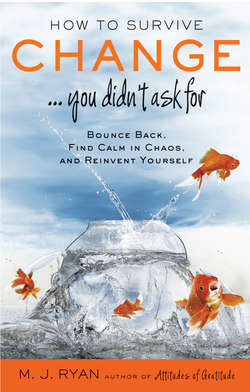Читать книгу How to Survive Change . . . You Didn't Ask for - M. J. Ryan - Страница 10
На сайте Литреса книга снята с продажи.
CHANGE TRUTH #2
ОглавлениеIt's Not Personal
When I hear somebody sigh, “Life is hard,” I am always tempted to ask, “Compared to what?”
—Sydney J. Harris
My phone rang. It was a well-known speaker and author asking to work with me. Let's call him Sam. “I've noticed over the last few years,” he said, “that things are changing. My speaking fees are beginning to go down and my book sales are, too. Fewer people are attending workshops. There are shifts happening, and I need to reposition myself in relationship to them to continue to make a living. Will you help me think that through?”
Instantly I said yes. Because Sam understood something crucial about change which will help him not waste time or precious emotional energy: it's not personal. He didn't blame himself for what was happening. He just observed it and realized he needed to respond in a new way.
What's happening right now to most of us is not because we're bad or wrong or incompetent. It's because the world is transforming at breakneck speed and each and every one of us must adapt to those changes as quickly and efficiently as possible. No one's exempt. Age doesn't get you off the hook (Sam is in his sixties, but you don't hear him complaining that he “should” be able to coast on his laurels until retirement). Nor does how hard you've worked until now, or what your expectations of your life have been. Or what you've sacrificed for or invested in. That's because what's going on has nothing to do with you personally!
Depersonalizing the change challenge you're facing gets you out of a sense of failure and frees up your thinking to be as adaptive as possible, like Sam. I remember the day I learned this. I went to hear Meg Wheatley, author of Leadership and the New Science. She's an expert at taking what is understood from the world of quantum physics and ecology and applying it to business. She's no flake—one of her major clients was the U.S. military. She was speaking about the fact that we're still stuck in a mechanistic model of the universe where we think we can make five-year plans for ourselves and our organizations, which is completely out of touch with the way living systems actually work. What I recall her saying was something like, “The way life happens is that things bump up against one another in an information-rich environment and change occurs. Some things thrive and others die out. Think of an aquarium with a bunch of fish. They're all doing fine. Then you put something different in there and it changes the whole ecosystem. Some fish survive, and others die as a result of the new input.”
At the time, I was struggling with the financial pressures of my book publishing company and sure I was doing something wrong. I probably was—but all my attention was focused on my “failure,” which wasn't helping me come up with new solutions. What Meg helped me do was see that I was just one of the little fish in a big aquarium whose ecosystem was changing.
Once I started viewing it that way, I was able to relate to the situation from a more objective and adaptive frame of mind. As I considered how to respond, it became clear that I wasn't interested in making the changes necessary to survive in the aquarium, and so I sold my company. Looking now from the outside at the publishing aquarium, I see even more clearly how what was going on really had nothing to do with me or my efforts.
If the aquarium image doesn't work for you, here's another technique for making the situation less personal. It's called self-distancing. It takes advantage of the brain's ability to make associated images (as if something's happening to you right now) and disassociated images (as if it's happening to someone else). Imagine you are watching a video starring someone else who is going through what you are right now. Give the person in the video a name and see him or her in the situation. Watch what's happening and ask yourself what could be going on that's beyond that person's control or influence. What's your advice for the person in the movie?
A spiritual teacher was once asked her secret to happiness and peace of mind. She replied, “A wholehearted, unrestricted cooperation with the unavoidable.” That's what I'm getting at here. It's not so easy—I'm still working on it and don't know many people who do it well. But I do know that the only responsibility we truly have in whatever's going on lies in developing our response-ability to whatever is occurring. As the surfers say, you've got to go with the flow. Otherwise you find yourself under the board faster than you can imagine.
You're Not the Only One
Resiliency experts have discovered that it's important to see that you're not the only one going through this change. That will help you feel less alone in your pain, which leads to feeling less stress. According to research, a broader perspective on the situation—“It's not just me”—also enabled people to come up with more innovative solutions and better plans of action. So take a look around—you've got plenty of company!
